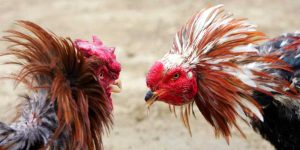Vitamins for chickens are an indispensable and important factor in the care and nourishment of this poultry flock. Adequate vitamin supplementation not only helps chickens grow healthily but also ensures good resistance, reduces the risk of disease and increases egg productivity. In this article, we will discover together what vitamins are necessary for chickens and how to supplement them effectively to achieve the best results in animal husbandry.
The importance of vitamin supplementation for chickens
Using vitamins for chickens plays an extremely important role in their development and health maintenance. Vitamins help strengthen the immune system so chickens are better able to fight diseases. In addition, vitamins also improve digestion, absorb nutrients and support the reproductive process.
When lacking vitamins, chickens can experience many serious problems such as slow growth, malnutrition, reduced egg productivity, and even death in chicks. Therefore, ensuring a sufficient supply of necessary vitamins helps chickens grow healthily. This means you will optimize economic efficiency in livestock farming, making chicken farming more efficient.
The influence of vitamins on chicken health
Vitamins at Thanhga com help strengthen the immune system, creating conditions for chickens to grow naturally and more safely. When the chicken’s body lacks vitamins, the immune system will be weakened, easily leading to the appearance of infectious diseases. Besides, vitamins also participate in many different physiological processes in the chicken’s body, from food metabolism to the formation of blood cells.
Healthy chickens usually have shiny feathers, the ability to move flexibly and are in a happy mood. On the contrary, chickens lacking vitamins will often become tired, sluggish and may show symptoms such as feather loss or dehydration.
Ensure balanced nutrition for chickens
To ensure the overall health of chickens, providing necessary vitamins is very important. Not only should we pay attention to providing individual vitamins, but farmers also need to consider the chicken’s overall nutrition. A balanced diet will help chickens receive the necessary amount of vitamins from natural food sources.
At the same time, combining vitamin-rich foods in the daily diet is also an optimal solution. A rich and diverse nutritional diet will contribute to improving the health and quality of life of chickens.
What kind of vitamins do chickens need to supplement?
To ensure chickens stay healthy and grow well, we need to pay attention to fully supplementing essential vitamins. These vitamins not only provide energy but also help improve resistance, productivity and egg quality.
In this section, we will learn about important vitamins for chickens:

The importance of vitamin supplementation for chickens
Vitamin A
Vitamin A is one of the most important vitamins for chickens. It helps maintain the health of the eyes, respiratory system and digestive system. Experts from Thanh Ga say that vitamin A deficiency can lead to problems such as decreased vision, swollen eyes, and weakened immune system.
To supplement vitamin A for chickens, you can provide foods such as carrots, pumpkin, green vegetables and cod liver oil. These food sources are high in beta-carotene, a precursor to vitamin A. This is important to ensure your chickens always have all the nutrients they need.
Not only does it help maintain health, vitamin A also supports bone development and improves coat durability. Chickens that are fully supplemented with vitamin A often have healthy, shiny feathers, making them look more beautiful and attractive in the eyes of farmers.
Vitamin D
Vitamin D plays an extremely important role in absorbing calcium and phosphorus, helping bones develop strong and reducing the risk of stunting. Especially for laying hens, this is a key factor to help improve eggshell quality.
Chickens can synthesize vitamin D when exposed to sunlight. Therefore, making sure the barn has enough natural light is very important. You can also supplement vitamin D for chickens through foods such as cod liver oil, eggs and specialized functional foods.
Vitamin D deficiency can cause serious problems, including stunting in chicks and reduced egg production in laying hens. That’s why it’s important to pay attention to vitamin D levels in your chicken’s diet.
Vitamin E
Vitamin E is a powerful antioxidant that helps protect chicken cells from damage caused by free radicals. It also plays an important role in strengthening the immune system and supporting reproduction. Vitamin E deficiency can lead to muscle wasting, seizures and loss of fertility.
Sources of vitamin E for chickens include vegetable oils such as wheat germ and canola oils. Doctor Nguyen Ngoc Phuong also emphasized that seeds such as sunflower and flax are also effective sources of vitamin E.
Supplementing vitamin E regularly will help chickens maintain good health and increase productivity. In addition, vitamin E also helps improve fertility in hens, thereby ensuring a more stable egg production.
Vitamin K
Vitamin K is an essential vitamin for blood clotting in chickens. It helps prevent bleeding and aids recovery after injury. When lacking vitamin K, chickens can experience uncontrolled bleeding and are at risk of death in severe cases.
Food sources rich in vitamin K can come from green vegetables such as broccoli and fermented foods such as hay and silage. To ensure chickens have enough vitamin K, farmers can add green vegetables to their diet.
Vitamin K deficiency can lead to many serious health problems, directly affecting the ability of chickens to survive and grow. Therefore, monitoring and adjusting the diet accordingly will help ensure the overall health of chickens.
Vitamin B Complex
Vitamin B Complex is a collection of B vitamins such as B1, B2, B3, and many others. They play an important role in energy metabolism, supporting the nervous system and promoting chicken growth. According to chicken raising knowledge from Thanh Ga, vitamin B deficiency can lead to problems such as slow growth, dermatitis, digestive disorders and nervous system deterioration.
Sources of vitamin B for chickens can come from whole grains, rice bran, eggs and poultry. With the right type and amount of vitamin B Complex, farmers can ensure that chickens stay healthy and grow well.
Vitamin B not only supports the process of converting food into energy but also helps chickens maintain a cheerful and active spirit. Vitamin B deficiency can cause chickens to become lethargic and less active.
Advice from experts on vitamin supplementation for chickens
Experts at Giới thiệu Thanhga recommend that farmers should regularly monitor and adjust the nutritional regimen to suit each stage of chicken development. In particular, adequate and proper supplementation of vitamins is a key factor to keep chickens healthy, increase resistance and optimize livestock productivity.
Depending on each stage of development, chickens’ vitamin needs will change. For example, chicks have higher vitamin requirements to grow quickly, while laying hens need more vitamins to produce high-quality eggs. Farmers need to clearly understand these characteristics to have a reasonable vitamin supplementation plan.
Also, make sure your chickens are raised in a clean, cool environment. At the same time, farmers need to expose them to enough natural light to support the synthesis of vitamin D. A good living environment will help chickens develop comprehensively, be both healthy and increase productivity.
Monitor chicken health
Monitoring chicken health is an indispensable part of the farming process. Pay attention to the chicken’s behavior. If you see signs of weakness, or unusual changes in behavior or health, you need to find out the cause immediately.
If there are signs of nutritional deficiency or unstable chicken health, immediately contact veterinarians or experts for timely advice and adjustment. This way, you can ensure that your chickens stay healthy and achieve their best performance.
Provide vitamins in stages
Each stage of chicken development has unique nutritional requirements. Farmers should research carefully to supplement vitamins suitable for each stage. Baby chicks may need more vitamins to grow quickly, while adult chickens may need vitamins to maintain overall health and productivity.
Advice from experts will help you have a more general overview of the vitamin needs of chickens at each stage and from there take appropriate supplementation measures.

Advice from experts on vitamin supplementation for chickens
Conclude
Supplementing chickens with vitamins properly is the key to their healthy growth and increased productivity. Understanding the role of each vitamin and providing them properly will help you nourish this type of poultry more effectively. With knowledge and advice from experts, you can ensure that your flock gets the best results in every situation. Pay attention to your chickens’ health and their nutrition to bring about comprehensive and sustainable development for your flock.